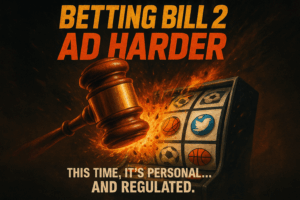In this week’s GME3 we’re looking at some potential concerns over charitable gaming in Alberta as we get closer to the expansion of the province’s online gambling framework, a new type of account on Meta that gives parents more control over their children’s social media use, and a legal battle between Miley Cyrus and Bruno Mars over alleged copyright infringement. Read the full stories here!
Gambling
Balancing the Odds in Alberta
As Alberta moves closer to the expansion of its online gambling framework that would allow private igaming companies to operate in the province, some are growing concerned that an influx of private gambling operators in Alberta could divert cash from local charities and leave traditional casinos struggling to compete.
For those unaware, the Alberta provincial government passed Bill 16 in May of this year, allowing for the regulation and oversight of iGaming (similar to Ontario). Previously, Alberta only had one legal, regulated igaming platform which is managed by Alberta Gaming, Liquor and Cannabis (AGLC).
However, Alberta also has a unique charitable gaming model where charitable organizations are licensed to conduct and manage casino events, as well as fundraising through bingo and selling raffle tickets. And, according to Michael Thompson, the executive director of the Alberta Charitable Casino Operators, that model will now be at risk.
Thompson argues that expanding the private sector of igaming will divert the revenue that originally went to charitable gambling endeavours. Between 2022 and 2023, casinos generated over $255 million for charities in Alberta. As such, he thinks that merely copying the Ontario market will not work for Alberta.
“We think the Ontario model will be very damaging to casinos in Alberta and charities will lose out significantly as a result. We think that’s going to be a disaster and they need to take the time to get it right.”
According to Thompson, casino operators in Alberta pay the highest rate of tax in Canada – a staggering 83% – which makes it impossible to compete with regulated iGaming companies. This is compared to the 20% tax rate for iGaming companies in Ontario. If Alberta taxes iGaming at the same rate, it will definitely put land-based casinos at a serious financial disadvantage.
Service Alberta and Red Tape Reduction Minister Dale Nally told CBC News that monies collected under the new model will be folded into general revenues, similar to the current system and that the province hasn’t worked out what the revenue splits with operators will be.
As Alberta expands its online gambling options, it’s important to think about how this could affect traditional casinos and the province’s charitable gaming model. While new iGaming rules might bring in more revenue, there’s a real concern about diverting funds from local charities. Finding a balance between growing the online gaming sector and protecting the contributions of charitable casinos will be crucial for keeping Alberta’s gaming industry both fair and sustainable.
Media
Taming the Teens
Meta is introducing a new type of account to offer better control for parents over their children’s social media use. Users under the age of 18 will automatically be sorted into new “teen accounts” which allow parents greater input into how teens use these platforms.
The new accounts allow parents to:
Set daily time limits for using the app;
Block teens from using Instagram at certain times;
See the accounts their child is exchanging messages with; and,
See the content categories their children are viewing.
Furthermore, teenagers signing up for Instagram are already placed into the strictest privacy settings, which include barring adults from messaging teens who don’t follow them and muting notifications at night. Under the new teen account, users under the age of 16 will need parental permission to change those settings, while 16- and 17-year-olds will be able to change them independently.
The change will go into effect for new users immediately, while also rolling out retroactively for existing accounts in the coming months.
Overall, Meta’s introduction of teen accounts represents a significant step toward giving parents more control over their children’s social media usage. By incorporating features like time limits, message monitoring, and stricter privacy settings, Meta is making it easier for parents to manage how their children engage with platforms like Instagram, while still allowing older teens some autonomy.
Entertainment
Flower Power Faces Sour Notes
Miley Cyrus is being sued over her chart-topping hit “Flowers” due to allegations that it infringes on Bruno Mars’ 2012 song “When I Was Your Man.” The lawsuit, brought forward by Tempo Music Investments, claims that “Flowers” copies key musical and lyrical elements from Mars’ song. According to the lawsuit, there are similarities in chord progressions, melodies, and lyrical themes, which they argue constitutes copyright infringement.
Despite these claims, Bruno Mars is not named as a plaintiff in the case. The suit specifically targets Cyrus, her label, and associated entities, seeking financial damages as well as a halt on the song’s performance and distribution. The allegations come after “Flowers” became one of the most successful singles of 2023, earning widespread acclaim and attention.
The lawsuit draws particular attention to the chorus of both songs, suggesting that the phrasing and melody in Cyrus’ “Flowers” closely echo Mars’ song. The legal action could lead to significant financial implications for Cyrus if the court rules in favour of the plaintiffs. This case adds to the growing trend of copyright disputes in the music industry as artists navigate the fine line between inspiration and infringement.
This lawsuit underscores the ongoing tension in the music industry over the boundaries between artistic inspiration and copyright infringement. With the potential for serious financial consequences, the case will be closely watched, not just for its impact on Miley Cyrus, but also for what it may mean for future creative works. If you’re curious about how these types of issues work, check out this great article that Daniel Trujillo wrote where he takes a deeper dive into the legal complexities!
GME Law is Jack Tadman, Zack Pearlstein, Lindsay Anderson, Daniel Trujillo, and Will Sarwer-Foner Androsoff. Jack’s practice has focused exclusively on gaming law since he was an articling student in 2010, acting for the usual players in the gaming and quasi-gaming space. Zack joined Jack in September 2022. In addition to collaborating with Jack, and with a keen interest in privacy law, Zack brings a practice focused on issues unique to social media, influencer marketing, and video gaming. Lindsay is the most recent addition to the team, bringing her experience as a negotiator and contracts attorney, specializing in commercial technology, SaaS services, and data privacy.
At our firm, we are enthusiastic about aiding players in the gaming space, including sports leagues, media companies, advertisers, and more. Our specialized knowledge in these industries allows us to provide tailored solutions to our clients’ unique legal needs. Reach out to us HERE or contact Jack directly at jack@gmelawyers.com if you want to learn more!
Check out some of our previous editions of the GME3 HERE and HERE, and be sure to follow us on LinkedIn to be notified of new posts, keep up to date with industry news, and more!




